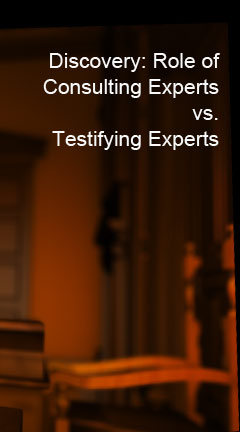Archival Notice
This is an archive page that is no longer being updated. It may contain outdated information and links may no longer function as originally intended.
Under Rule 26(b)(4) of the Federal Rules of Civil Procedure (FRCivP), a critical distinction is made between experts who do not testify — those who are merely consultants — and those who are retained for litigation purposes. Trial experts are generally subject to full discovery, whereas consultants are usually immune from that obligation. (Source: Daniels, James E., "Managing Litigation Experts," ABA Journal 70 (December 1984): 64.)
A major revision to the FRCivP became effective in December 2006 under Rule 26(b)(4), which specifically addresses expert witnesses. Normally, an expert who has been retained for consultation, but is not expected to testify at trial, need not provide documents or other material for discovery, unless, as stated under Rule 26(b)(4), it can be shown that a manifest injustice would occur if the materials were not provided. As always, it is important for the expert to discuss the scope of his role with the retaining attorney.
Some criminal courts have also recognized the distinction between experts who serve only as consultants and those who are hired to testify. For example, the Court of Criminal Appeals of Oklahoma has held that a defendant's non-witness psychiatric expert was not subject to prosecutorial discovery because the expert was "consulted ... in the course of preparing for trial or a capital sentencing proceeding." However, this protection against discovery is not absolute in the criminal context and may depend on jurisdiction, constitutional concerns and interpretations of the attorney-client privilege.
(Sources: Van White v. State, 990 P.2d 253, 271 (Okla. Crim. App. 1999); Maringer, E.F., "Witness for the Prosecution: Prosecutorial Discovery of Information Generated by Non-Testifying Defense Psychiatric Experts," Fordham Law Review 62 (December 1993): 653; Saks, Michael J., "Book Review: Ethics in Forensic Science: Professional Standards for the Practice of Criminalistics," Jurimetrics Journal 43 (Spring 2003): 359; Imwinkelried, Edward J., "The Applicability of the Attorney-Client Privilege to Non-Testifying Experts: Reestablishing the Boundaries Between the Attorney-Client Privilege and the Work Product Protection," Washington University Law Quarterly 68 (Spring 1990):19.)
On the subject of privilege, an American Bar Association journal article comparing trial and consultation experts suggests that the expert and attorney should confer (keeping in mind the rules of liberal discovery) before placing in the expert's hands a sensitive document or revealing to the expert what could be potentially damaging information. (Source: Daniels, James E., "Protecting Your Expert During Discovery," ABA Journal 71 (September 1985): 50.)
Additional Online Courses
- What Every First Responding Officer Should Know About DNA Evidence
- Collecting DNA Evidence at Property Crime Scenes
- DNA – A Prosecutor’s Practice Notebook
- Crime Scene and DNA Basics
- Laboratory Safety Programs
- DNA Amplification
- Population Genetics and Statistics
- Non-STR DNA Markers: SNPs, Y-STRs, LCN and mtDNA
- Firearms Examiner Training
- Forensic DNA Education for Law Enforcement Decisionmakers
- What Every Investigator and Evidence Technician Should Know About DNA Evidence
- Principles of Forensic DNA for Officers of the Court
- Law 101: Legal Guide for the Forensic Expert
- Laboratory Orientation and Testing of Body Fluids and Tissues
- DNA Extraction and Quantitation
- STR Data Analysis and Interpretation
- Communication Skills, Report Writing, and Courtroom Testimony
- Español for Law Enforcement
- Amplified DNA Product Separation for Forensic Analysts


